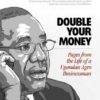Columnists
Africa is rising; but for whom?
African governments are taxing the poor to compensate the rich!
who attended the ‘chat’Last week was one of the well spent weeks of my life. I spent it at the shores of the Indian Ocean in Tanzania with a group of young leaders drawn from all over Africa. We were chatting about things that are rarely talked about on our continent. We were talking ‘social justice and democracy’.
Friedrich Ebert Stiftung (FES), a Germany political foundation, brought together a vibrant group of young African men and women to discuss how best their generation may advocate for equality, fairness and social rights on this troubled continent.
I was invited to talk about an interesting question: “When does inequality become unfair?” May I say I was thrilled. I was delighted because I have always been telling my friends that Africa is unique. It is the only place on earth where victims are willing to spend much of their time listening to recycled speeches of their oppressors than discussing topics like this, let alone demanding for their innate entitlements.
Bob Kerry, the U.S. Senator, is widely quoted to have said, “When you’re fighting for economic and social justice, you’re always fighting for the minority.” In Africa, however, fighting for social justice is certainly fighting for the majority. A large majority of the people in Africa have a pretty appalling standard of living. This is happening on a continent of plenty!
Therefore, having a conversation on social justice among Africa’s next generation of leaders was a very constructive way of spending the week in the hot Dar es Salaam beaches. I invoked the young leaders to start interrogating the “Africa Rising” narrative, with which many have fallen in love, with a quip: Africa is rising; but for whom?
Obscenely rich
I helped the young leaders with some facts about the genesis and distribution of the benefits of the ‘rising’ Africa.
Inequality of outcomes, well-being, opportunities, freedom, and other non-income dimensions of people’s well-being, is not unique to Africa. The world has become more unequal, the poor metrics of measuring the inequality notwithstanding.
However, Africa presents a very disturbing reality; high inequality in the midst of high poverty levels. Six of the 10 most unequal countries in the world are in Africa. Economists use the Gini index (a number between zero and 100) to measure inequality. Zero represents perfect equality, while 100 implies perfect inequality.
Although this metric does not capture critical aspects of inequality, even by this poor standard African countries are performing very badly.
South Africa is the gold medalist in inequality in the world with a Gini index of 65, followed by Namibia (60.9), Botswana (60.5), Central African Republic (56.2), Zambia (55.6), and Lesotho (54.2). In East Africa Rwanda is most unequal (50.8), followed by Kenya (47.7), Uganda (42.4), and Tanzania (37.8).
Additionally, household survey data shows that the number of extremely wealthy Africans and differences between urban and rural areas and across regions are increasing. The benefits of economic growth are going to the few who are already obscenely rich.
Condemning the poor as lazy
Economists have been lately been helped by philosophers to understand the significance of social justice and fairness. Today there are certain broadly shared beliefs about what is fair and unfair. If some people have to work much harder than others of similar talent to do well, then society is unfair.
I told the young leaders not to behave like the current breed of African leaders who have failed to understand the essence of economic progress and humanity. They are emphasising what matters less – statistics, and ignore what matters most – on-the-ground-realities.
What matters most is a clear understanding of (1) what inequality really is, basing on real life, everyday experiences before our eyes and ears instead of relying exclusively on the (poorly compiled) statistics, and (2) when inequality actually becomes unfair. I have already answered the first part.
Inequality becomes unfair in a number of ways: first, when public attitudes toward the poor harden by condemning them as lazy without proper assessment of the social structure in which they live. Secondly, when politics becomes the vehicle for creating the inequality, then the latter becomes unfair.
Angus Deaton, the 2015 Nobel Laureate in Economics, argues that the worsening inequalities in the world today are mainly caused by “those who have escaped poverty protecting their positions by destroying the escape routes behind them.”
‘Opportunity equaliser’
Economists believe that there are two ways to become wealthy: to create wealth or to take wealth away from others. Africa is the perfect laboratory for those who want to confirm that much of the wealth today stems from wealth transfers instead of wealth creation.
Thirdly, when society turns aristocratic, where wealthy families get richer simply by sitting on their parents’ laurels & collect what Thomas Piketty calls “rentier income, then the resultant inequality is unfair. Warren Buffett puts it better, “It is like choosing the 2020 Olympic team by picking the eldest sons of the gold-medal winners in the 2000 Olympics.”
Fourth, inequality is also unfair when people are denied good education and skills, thereby perpetuating the inequality across generations. In Africa, or at least in Uganda which I know better, education is structured in such a way that the rich (with access to quality education) will become better educated and stay rich, while the poor (who have been confined to poor quality UPE) will barely make it. Yet it is an open secret that education is the most reliable ‘opportunity equaliser’.
Fifth, when people try hard to meet their responsibility to contribute to society, but society is not meeting its responsibility to them, then inequality becomes unfair. Our societies, poorly governed as they are, also tend to emphasise the responsibilities of the ‘common’ citizen, but rarely extend this emphasis to what can be fairly expected from those at the top.
Equality is good for everyone
When governments stop caring about equity and concentrate on efficiency, then inequality becomes inevitable. And it’s unfair. Most government in Africa are more worried about the size of the pie and are paying absolutely no attention to how the pie is shared among the members of the society – the so-called Pareto efficiency.
Distributive justice (the fair, just and equitable distribution of benefits and burdens) is being disregarded by the current leaders. Decisions are not affecting everyone equally, and resources are not being shared equally.
Lastly, I told the young leaders that they should desist from what the current crop of leaders in Africa are doing – taxing the poor to compensate the rich.
Data from African Tax Justice Network, for example, shows that the poor in Kenya, Tanzania, Rwanda and Uganda alone pay a total of US$2.8 billion every year to their governments which they use as tax incentives to multinational companies! This certainly perpetuates inequality, and it’s unfair.
One question I love asking my students of development economics is; “Why do you think everyone should care about inequality, including the rich?” While attempting to answer this question, generations of students tend to go textbook; citing ethical grounds and a myriad of functional reasons.
Although most of the textbook answers are correct, they do not explain why a rich person, beyond the moral appeal, should care about inequality. I often use our everyday experiences to confirm to my students that equality is good for everyone, more so for the rich.
We’re no longer sleeping
I used the same illustration to get the young African leaders appreciate this oxymoron. In many other African countries, people are no longer sleeping. The poor do not sleep because they are hungry, and the rich do not sleep because the poor are awake.
Without caring about the millions of the youth roaming the streets of cities and other towns unemployed, the freedom of the few Africans who have escaped poverty will remain only temporary.
The “rich” in many African cities now spend their sleepless nights in self-inflicted “jails”. Every nice house is enclosed in a tall perimeter. On top of the perimeters are electrified wire obstacles, permanently watched by armed guards and a pride of dogs. All inlets into the house (doors, windows, and ventilators) are fitted with burglary proof and locked with massive padlocks!
To the privileged folks, such as politicians and tycoons, not even that detail is secure enough; so they sleep with a hand weapon – a pistol. Those lower in ranking sleep with a panga or machete, or a big stick somewhere near the pillow.
What do they fear? They know that out there are young men and women who are not only hungry but also feel deprived and cheated by those who have materials possessions and other unfairly distributed opportunities.
So they can easily break into their beautiful homes uninvited at midnight or thereafter and harm them. As this example illustrates, everyone benefits from equality. And to build equal or unequal societies comes down to choice. Equal societies chose equity and equality; unequal societies chose inequity and inequality.
Comments
















